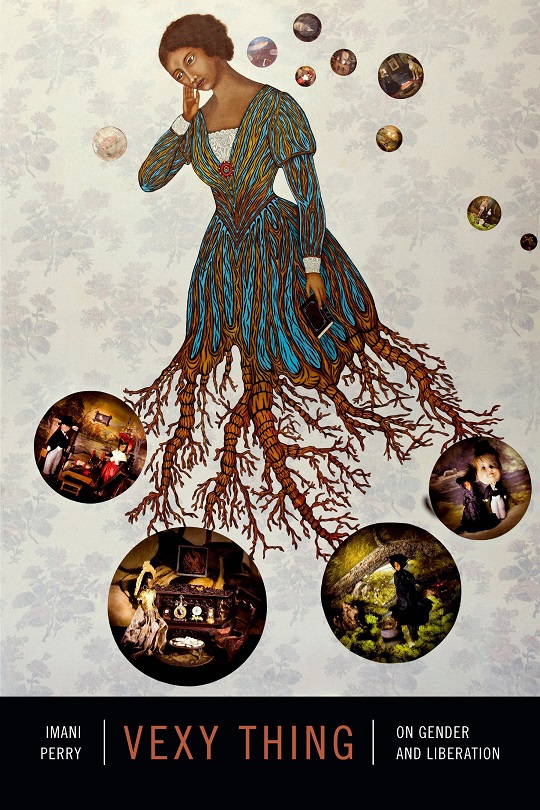Vexy Thing: A New Book on Gender and Liberation
This post is part of our blog series that announces the publication of selected new books in African American History and African Diaspora Studies. Vexy Thing: On Gender and Liberation was recently published by Duke University Press.
***
 The author of Vexy Thing is Imani Perry, the Hughes-Rogers Professor of African American Studies at Princeton University where she also holds affiliations with the Program in Law and Public Affairs and Gender and Sexuality Studies. She is the author of numerous books: Prophets of the Hood: Politics and Poetics in Hip Hop (Duke University Press), More Beautiful and More Terrible: The Embrace and Transcendence of Racial Inequality in the US (New York University Press), May We Forever Stand: A History of the Black National Anthem (University of North Carolina Press) and Looking for Lorraine: The Radiant and Radical Life of Lorraine Hansberry (Beacon Press), as well as numerous articles in the fields of legal history, cultural studies and literary studies. Follow her on Twitter @imaniperry.
The author of Vexy Thing is Imani Perry, the Hughes-Rogers Professor of African American Studies at Princeton University where she also holds affiliations with the Program in Law and Public Affairs and Gender and Sexuality Studies. She is the author of numerous books: Prophets of the Hood: Politics and Poetics in Hip Hop (Duke University Press), More Beautiful and More Terrible: The Embrace and Transcendence of Racial Inequality in the US (New York University Press), May We Forever Stand: A History of the Black National Anthem (University of North Carolina Press) and Looking for Lorraine: The Radiant and Radical Life of Lorraine Hansberry (Beacon Press), as well as numerous articles in the fields of legal history, cultural studies and literary studies. Follow her on Twitter @imaniperry.
Even as feminism has become increasingly central to our ideas about institutions, relationships, and everyday life, the term used to diagnose the problem—”patriarchy”—is used so loosely that it has lost its meaning. In Vexy Thing Imani Perry resurrects patriarchy as a target of critique, recentering it to contemporary discussions of feminism through a social and literary analysis of cultural artifacts from the Enlightenment to the present.
Drawing on a rich array of sources—from nineteenth-century slavery court cases and historical vignettes to writings by Toni Morrison and Audre Lorde and art by Kara Walker and Wangechi Mutu—Perry shows how the figure of the patriarch emerged as part and parcel of modernity, the nation-state, the Industrial Revolution, and globalization. She also outlines how digital media and technology, neoliberalism, and the security state continue to prop up patriarchy. By exploring the past and present of patriarchy in the world we have inherited and are building for the future, Perry exposes its mechanisms of domination as a necessary precursor to dismantling it.
“Given the political turn in the United States in November of 2016, Imani Perry’s Vexy Thing will become a central text for those involved in discussions of that thing called ‘the patriarchy.’ By thinking of patriarchy as a single phenomenon across different registers, Perry guides readers into their own sense of its stronghold on American, if not global, iterations of self and other, state and nation. This is a powerful statement about feminism for the here and now.” — Sharon Patricia Holland, author of ‘The Erotic Life of Racism’
J.T. Roane: What type of impact do you hope your work has on the existing literature on this subject? Where do you think the field is headed and why?
Imani Perry: This is such an exciting time for feminist thought. On the one hand, discussions of gender and sexuality and how to liberate ourselves from gender based violence and injustice are actively debated in the public sphere. People of all stripes are thinking a great deal about gender. At the same time, there is a growing and complex body of feminist scholarship coming from the various disciplines. Consequently, feminist thought is moving in many directions at once, and at best feminists are insisting upon complex accounts of gender and unapologetic arguments for gender liberation. This book is one in that number. The beginning of the book offers a description of patriarchy as structure that emerged in the context of modernity and empire. It pushes past our tendency to talk about patriarchy solely in terms of ideology, and accounts for how gendered relations of power were created by law. I also refuse to separate out an understanding of patriarchy as separate from other forms of domination. Instead patriarchy is fundamental to all sorts of domination that has existed since the 18th century.

